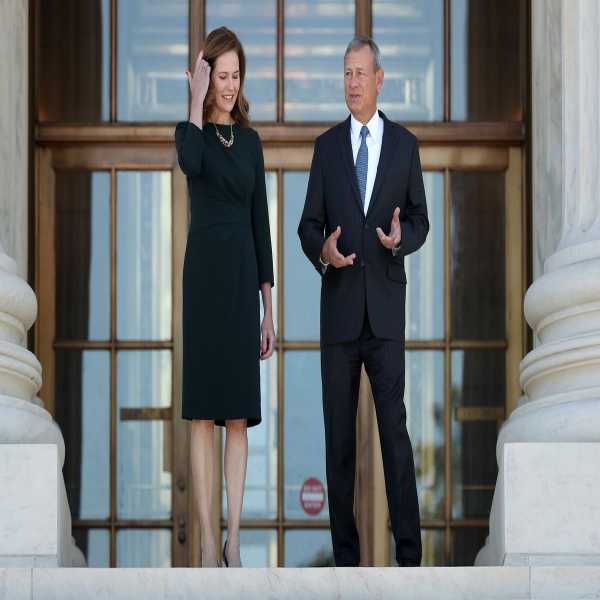A SCOTUS case about disabled travelers is likely to end in a whimper. That’s probably the best possible outcome.

Justice Amy Coney Barrett (left) and Chief Justice John Roberts pause for photographs at the top of the steps of the west side of the Supreme Court following her investiture ceremony on October 1, 2021. Chip Somodevilla/Getty Images Ian Millhiser is a senior correspondent at Vox, where he focuses on the Supreme Court, the Constitution, and the decline of liberal democracy in the United States. He received a JD from Duke University and is the author of two books on the Supreme Court.
Pretty much no one thinks that Deborah Laufer, the plaintiff in a civil rights suit that the Supreme Court heard on Wednesday, should be allowed to move forward with her lawsuit. That includes Laufer herself, who has asked the courts to dismiss her case.
Indeed, the only thing that appeared uncertain during Wednesday’s arguments in Acheson Hotels v. Laufer is which of two alternative arguments the Court will embrace when it dismisses this case.
The stakes in Acheson Hotels also seemed to diminish as the argument proceeded. Many civil rights lawyers feared that the GOP-controlled Supreme Court would use this case as a vehicle to drastically roll back the rights of “testers,” individuals who volunteer to be subject to discrimination so that they can bring a federal lawsuit challenging that discrimination. But that outcome now appears unlikely.
At least twice during the oral argument, attorney Adam Unikowsky, the lawyer representing a hotel that was sued by Laufer, insisted that he is not urging the Court to overrule Havens Realty v. Coleman (1982), an important Supreme Court precedent laying out the right of testers to bring civil rights suits. And two conservative justices, Chief Justice John Roberts and Justice Brett Kavanaugh, both agreed that this case is different from Havens.
The bottom line, in other words, is that the Acheson Hotels case is likely to end in a whimper — and possibly with a sigh of relief from the hotel industry.
Two ways to make this case go away
Laufer’s case begins with a federal regulation, known as the “Reservation Rule,” which requires hotel websites to “identify and describe accessible features in the hotels and guest rooms offered through its reservations service in enough detail to reasonably permit individuals with disabilities to assess independently whether a given hotel or guest room meets his or her accessibility needs.”
These hotels aren’t necessarily required to actually offer accessible rooms, but the Reservation Rule is intended to prevent a disabled individual from booking a room in a distant town, only to discover upon their arrival that they cannot use the room that they’ve booked.
Laufer is a disabled woman who has filed more than 600 different lawsuits against hotels that did not comply with this rule — most of which she appears to have no intention of actually patronizing. She has, in the past, employed lawyers with not-so-sterling ethical records in order to do so. One of her former lawyers, for example, was recently suspended from the bar of a Maryland federal court due to allegations that he was engaged in a scheme to squeeze money out of the defendant hotels for work this lawyer never actually did.
In any event, there are two good reasons why Laufer’s suit against one of these hotels should be dismissed.
The first involves a rule known as “standing.” As a general rule, no one is allowed to bring a suit in federal court unless they’ve been injured in some way by the person they are suing. This injury, moreover, may not be a “generalized grievance,” meaning that it cannot be one that is shared widely by many other people. Rather, the plaintiff must allege a “particularized” injury that sets them apart from other people.
During the oral argument, Justice Ketanji Brown Jackson offered a hypothetical that lays out how this requirement works. Imagine that there is a racist restaurant that refuses to serve Black customers, or that treats them differently than white customers. Now imagine that a Black individual sees this happening and decides to sue — but that this plaintiff does not actually attempt to patronize the restaurant before he does so.
In Jackson’s hypothetical, this plaintiff lacks standing to sue because he has only a generalized grievance regarding how the restaurant treats all Black people, but he hasn’t specifically been harmed by the restaurant himself. To file a federal lawsuit, he would need to attempt to patronize the restaurant and personally face discrimination.
As Jackson indicated, Laufer stands in shoes similar to those of this hypothetical plaintiff. She has not actually stayed at the hotel she sued in the Acheson Hotels case, nor does she have any intention of staying there. Her grievance is that the hotel’s website did not provide her with information, but that information is also unavailable to anyone else who goes to that website. That is not a particularized injury.
So the Court could dismiss the case on standing grounds, but it could also dismiss it under a closely related doctrine, known as “mootness.”
A case becomes moot if, even though there was initially a valid legal dispute between a plaintiff and a defendant, that dispute no longer exists. And, as several justices pointed out, there are a number of reasons why this case is moot — including the fact that Laufer herself wants to kill her suit. As Justice Clarence Thomas asked at the very beginning of the oral argument, Laufer “says she has withdrawn her suits, so why should we decide this?”
Indeed, no one really seemed to question that the case is moot. But Unikowsky nonetheless urged the justices to decide the standing issue rather than the mootness issue, largely because that outcome would make it harder for plaintiffs like Laufer to sue hotels in the future.
So what’s really at stake here?
Unikowsky’s plea for a standing decision, as opposed to a mootness decision, is understandable. Hotels don’t like being sued, and they don’t want a legal regime where disabled people who do not intend to actually visit their hotels can nonetheless sue them. And at least some of the justices, most especially Chief Justice Roberts, seemed very sympathetic to this concern.
As Roberts said at one point, he’s concerned about rewarding “manipulation of this Court’s jurisdiction,” where a plaintiff can sue a hotel, attempt to pressure that hotel into settling the case, and then dismiss the case if the hotel refuses to settle and tries to obtain a precedential decision dismissing the case for lack of standing.
Yet it was also quite clear, as the argument proceeded, that deciding the standing issue in this case would be more difficult than resolving the mootness question.
To dismiss the case as moot, the Court would simply need to note that Laufer has withdrawn her suit and that the hotel website is now in compliance with the Reservation Rule. So there’s no possibility that she could sue this hotel again for the same alleged violation because it is now in compliance with the law.
Dismissing the case on standing grounds, by contrast, could require the justices to define the boundaries of who does or does not have standing to bring Reservation Rule suits. Suppose that a blind individual cannot use a hotel website at all, Justice Elena Kagan asked at one point? Or suppose, Justice Amy Coney Barrett asked, that a disabled patron attempts to make a reservation at a hotel, then gets frustrated because the website does not comply with the Reservation Rule and gives up? Would these individuals have standing to sue?
One dog that did not bark in this argument is that much of the civil rights bar feared that the Court would use this case to roll back Havens Realty, the precedent establishing that civil rights testers may bring federal lawsuits even if they intentionally subjected themselves to discrimination.
In Havens Realty, two individuals, one Black and one white, inquired about renting units at two apartment complies. The white tester was told that units are available, while the Black tester was allegedly lied to and told that no units were available. The Supreme Court held that the Black tester had standing to bring a housing discrimination claim, even though she did not actually intend to rent an apartment, because she suffered a particularized injury when she was allegedly lied to because of her race.
In any event, none of the justices seemed eager to overrule Havens Realty, and some of them explicitly disclaimed any interest in doing so. As Kavanaugh said at one point, “I agree that discriminatory treatment is itself an injury — certainly in Havens Realty.”
That means that the stakes in the Acheson Hotels case are probably now lower than they were going into the oral argument — although they are hardly nothing. The question of whether the Court will decide this case on standing or mootness grounds still matters a great deal to the hotel industry.
But the case is unlikely to end in disaster for the civil rights bar.
Sourse: vox.com






